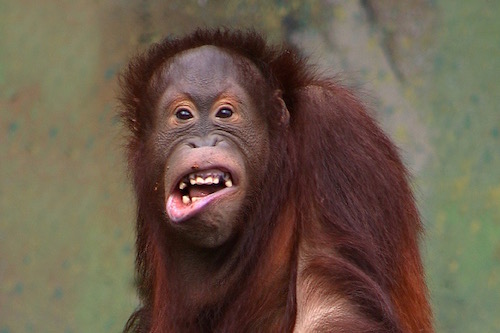 Culture & Ethics
Culture & Ethics
 Human Origins
Human Origins
 News Media
News Media
In the NY Times, Primatologist Frans de Waal Takes a Swing at Human Exceptionalism

Science, properly understood, is a method of obtaining knowledge. But it isn’t as simple as that. The way it is approached often reflects the biases and ideology of the scientist. Sometimes a scientists knows what she wants to discover, and by golly, goes right ahead and finds just that.
I’ve noticed for years that many life scientists — for example, the novelist (as I call her) Jane Goodall — seem zealously bent on disproving the exceptional status of human beings. In this they are aided by the media.
The New York Times, for one, makes a habit of lashing out at human exceptionalism. That was the case again over the weekend when the paper published an essay by primatologist Frans de Waal.
Because the biology of brains is remarkably similar across species, de Waal admits, life scientists now come to their research from an explicitly anti-HE premise. He writes in “What I Learned from Tickling Apes“:
Brains are in fact so similar across the board that we study fear in the rat’s amygdala to treat human phobias. This doesn’t mean that the planning by an orangutan is of the same order as me announcing an exam in class and my students preparing for it, but deep down there is continuity between both processes. This applies even more to emotional traits.
This is why science nowadays often starts from the opposite end, assuming continuity between humans and animals, while shifting the burden of proof to those who insist on differences. Anyone who asks me to believe that a tickled ape, who almost chokes on his hoarse giggles, is in a different state of mind than a tickled human child has his work cut out for him.
That’s a neat trick, conflating biological similarities with moral distinctions to come to the desired humans-are-just-another-animal-in-the-forest “scientific” conclusion.
But human exceptionalism isn’t about mere biology. Rather, it speaks to the dramatic — and undeniable — differences between humans and all other species that are moral in nature.
Let’s look at tickling. The reaction to tickling is reflexive. Similarly, if I scratch a dog’s ears, he is likely to sigh and relax in the same manner as a human receiving a massage. But having similar reactions to sensation doesn’t mean that the ape and the dog’s moral status equates with that of humans.
Tellingly, de Waal wants science to engage in anthropomorphism.
After a lifetime of working with chimpanzees, bonobos and other primates, I feel that denial of the similarities is a greater problem than accepting them. Relabeling a chimpanzee kiss “mouthtomouth contact” obfuscates the meaning of a behavior that apes show under the same circumstances as humans, such as when they greet one another or reconcile after a fight. It would be like assigning Earth’s gravity a different name than the moon’s, just because we think Earth is special.
No it isn’t. Animals feel emotions, including love. No one questions that. And observations about behavior certainly become relevant to assessing our human duties of care toward animals.
But that — moral agency — is one of the unique attributes that make us exceptional. No animal has any “duties” to do anything toward each other, us, or the environment. Hence, they cannot be held morally accountable for violating such obligations.
Moral agency cannot be explained simply by brain structure or the fact that animals and humans are all constructed physically by carbon molecules. Nor can instinctual behavior that might have monkeys shunning a member of their clan that steals food. Moral duties are derived through rational processes and interactions in which only humans can engage. Which is why they may vary from culture to culture.
And then, de Waal gets to the nub. Anti-human exceptionalism is aimed at convincing us that we are merely one part of nature, toward the end that we act in a way that better serves the policy preferences of environmentalists and animal rights believers:
One reason this whole debate is as heated as it is relates to its moral implications. When our ancestors moved from hunting to farming, they lost respect for animals and began to look at themselves as the rulers of nature. In order to justify how they treated other species, they had to play down their intelligence and deny them a soul. It is impossible to reverse this trend without raising questions about human attitudes and practices. We can see this process underway in the halting of biomedical research on chimpanzees and the opposition to the use of killer whales for entertainment.
But again, those policy shifts came about because of our exceptionalism. We have consciences, and moral beliefs. Animals don’t have moral beliefs.
Finally, de Waal raises a straw man:
There is nothing wrong with the recognition that we are apes — smart ones perhaps, but apes nonetheless. As an ape lover, I can’t see this comparison as insulting. We are endowed with the mental powers and imagination to get under the skin of other species. The more we succeed, the more we will realize that we are not the only intelligent life on earth.
Good grief, who says we are? And of course, when he says we are “endowed,” what he should have said is only we are thus endowed.
This discussion is not the same as musing over a beer. Anti-human exceptionalism is dangerous. The unique value of man is an idea at foundation of Western civilization. Acting in accord with our responsibilities helps maintain a moral society. Taken together, they account for our liberty and prosperity.
Or look at it this way: If we demote ourselves into just another animal in the forest, that is precisely how we will act.
Image: “Laughing” orangutan, by Malene [GFDL, CC-BY-SA-3.0 or CC BY 2.5], via Wikimedia Commons.
